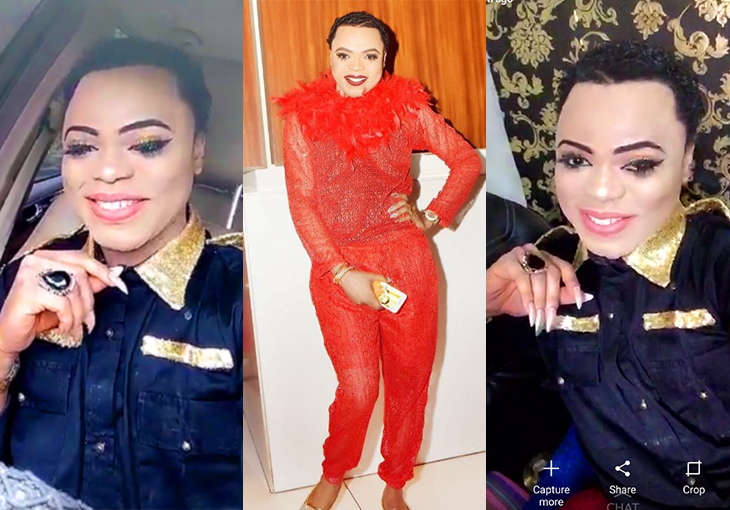There’s a new guy on Nigeria’s social-media scene, and his name is Bobrisky. With his larger-than-life personality and extravagant lifestyle, he has built a large online following seemingly overnight.
Born Idris Okuneye Olanrewaju, Bobrisky is the baby of a polygamous Yoruba family, his late mum being the most junior of three wives. The nickname ‘Bobo’ which loosely translates as ‘chap’ or ‘guy’ in Nigerian slang came with being the youngest in the house. After adding a slight twist to it, Bobrisky was born. Think of him as a living, Lagos-dwelling version of Joanne the Scammer. Unlike Joanne, however, Bobrisky is not an act.
Some might see him as yet another attention-seeking, self-indulgent online personality, and they may not be wrong.
Raised in a Muslim home, Bobrisky recently celebrated Eid with his father, grandmother and local neighbours in his hometown of Ijebu in grand style, footing a large food bill for dozens of neighbours and offering cash gifts.
Bobrisky also has no problem treating himself. His Snapchat stories are show reels of expensive clothes and parties. He likes to party, shop and dance.
Some might see him as yet another attention-seeking, self-indulgent online personality, and they may not be wrong. Yet, Bobrisky’s social media performance is also an act of bravery. Being a vocal, cross-dressing, makeup-loving man who is dating a man in a country like Nigeria takes a lot of balls. Not only is ‘carnal knowledge of any person against the order of nature’ punishable by a 14-year prison sentence, gay rights advocacy is illegal and polls suggest that almost nine out of ten Nigerians support this stance.
In this context, it is not hard to see why Bobrisky has never publicly come out as gay, despite repeatedly gushing over his married boyfriend – the anonymous older lover who funds his luxurious lifestyle. He also downplays his cross-dressing as a mere marketing ploy for his business.
‘I never said I am gay to anybody. People say my look, makeup, the way I talk… It’s gay. But I own a boutique. So I have to put everything on to advertise my products.’
The products in question are clothes and skin-lightening creams – the latter being a major source of Bobrisky’s notoriety. His foray into the skin-bleaching business began when he started using lightening creams after a friend said that he was ‘too black’. Even though his drastic transformation didn’t sit well with his father, it got him a lot of attention from others interested in his beauty secrets. He says he sells his creams to 17 countries all over the world including Zimbabwe, Gambia, the UK, US and Canada. His recent popularity has made business even better.
‘It’s really helping me because people are like “Go and add him on Snapchat. Go and add him on Instagram. He looks really fabulous.”’
Bobrisky plans to stay fabulous – you’ll rarely see him without makeup or a manicure. His persona is carefully constructed. This points as much to his precarious position as a queer man living in a virulently homophobic country, as it does to his status as a social-media celebrity – many of whom maintain picture-perfect images by painstakingly screening selfies. He is a living contradiction, lauding the ‘bae’ who ‘changed [his] life’ while often refusing to talk about him. As he coyly said in a Facebook interview with thenet.ng
‘I said my bae is one of the richest persons in Africa – boy or girl, I won’t say. Anything about my bae, I won’t mention it here. It is personal.’
Bobrisky, however, has no desire to keep bae’s gifts private. He often posts pictures of cash and lavish nights out, all attributed to the omni-funding bae who also sponsored the Eid extravaganza he held for his family and friends in Ijebu. Bobrisky is eternally grateful to bae, and never hesitates to tell everyone this.
‘Without him, Bobrisky won’t be here, because I was nobody.’
Bobrisky seems to be living life in a transparent closet, inviting viewers into his world while simultaneously keeping them at arm’s length.
He certainly isn’t ‘nobody’ anymore. Whether this is a good or bad thing is unclear. Bobrisky could be a great conversation starter for LGBT issues in Nigeria but some argue that his following is simply voyeuristic, and not a true reflection of shifting attitudes. Either way, Bobrisky doesn’t seem to care what others think of him.
‘Bobrisky is who Bobrisky is. You can never change Bobrisky. I am myself. Anybody can actually say anything. I can’t prove anything to anyone. I can only be myself.’
Bobrisky seems to be living life in a transparent closet, inviting viewers into his world while simultaneously keeping them at arm’s length. Yet, being true to oneself is difficult to do in small doses; openness is seductive. Bobrisky might be holding back but, with a mischievous laugh, he suggests that this might not be the case for much longer.
‘That’s the little I’ll say about Bobrisky for now. You’ll still know more, though.’

